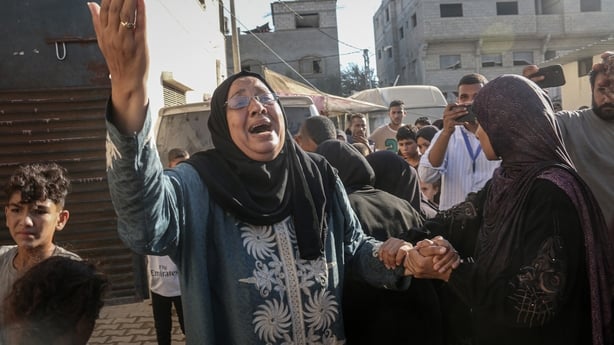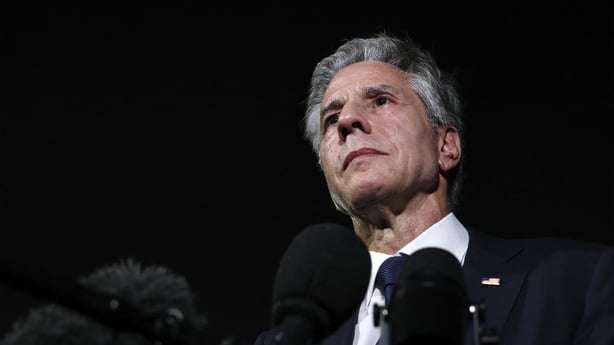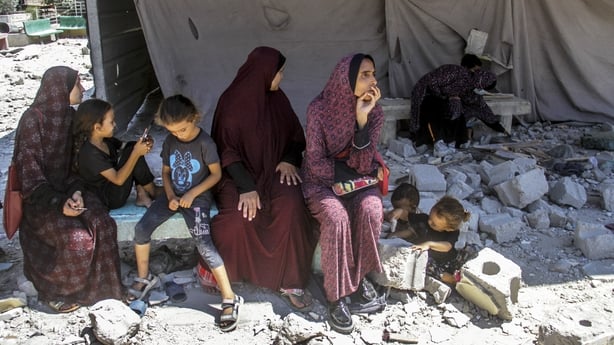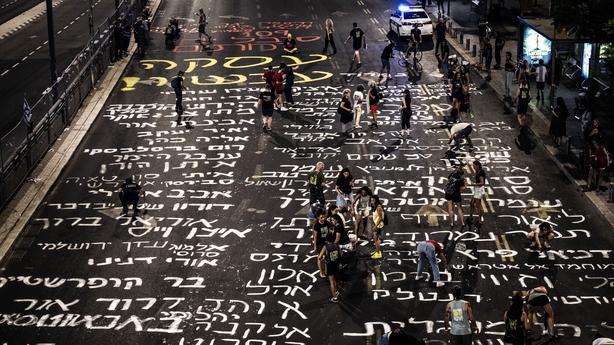Israeli airstrikes across Gaza have killed at least 50 Palestinians in the past 24 hours, Palestinian health officials said, after US Secretary of State Antony Blinken ended his latest visit to the region with a truce deal still elusive.
As last-ditch diplomatic efforts continued to halt the ten-month-old war between Israel and Hamas, the Israeli military said jets hit around 30 targets throughout Gaza, including tunnels, launch sites and an observation post.
It said troops killed dozens of armed fighters and captured weapons including explosives, grenades and automatic rifles.
Later in the day, the Israeli military struck a school and a nearby house in Gaza City, killing at least four people and wounding 15, the territory's Civil Emergency Service said.
The military said in a statement that it had hit Hamas militants operating at a command center located inside a compound that had previously served as a school.
It accused Hamas of continuing to operate from within civilian facilities and areas, an allegation Gaza's dominant Islamist militant group denies.
Commenting on the attack on the UN-run school, the head of the UN's Palestinian refugee agency, Philippe Lazzarini, wrote on X that "Children reported killed and injured. Some were burnt to death."
"Gaza is no place for children anymore. They are the first casualty of this merciless war. We can't let the unbearable become a new norm. Enough. A ceasefire is beyond overdue," Lazzarini wrote.
In the town of Bani Suhaila near Khan Younis in southern Gaza, an Israeli airstrike killed seven Palestinians at a tent encampment for displaced people, medics said.

The military issued new evacuation orders in the heavily overcrowded area of Deir Al-Balah, in central Gaza, where hundreds of thousands of Palestinians displaced by the fighting have sought shelter.
The evacuation orders, which the military said were needed to clear civilians from what had become "a dangerous combat zone", were soon followed by tank fire with at least one person killed and several wounded by machine gun fire, medics and residents said.
Biden discusses ceasefire with Netanyahu in phone call
US President Joe Biden spoke by phone with Israeli Prime Minister Benjamin Netanyahu earlier about ways to advance a potential Gaza ceasefire and hostages deal, the White House said.
The call followed US Secretary of State Antony Blinken's whirlwind trip to the Middle East that ended on Tuesday without an agreement between Israel and Hamas militants on a truce in the Palestinian enclave.
Mr Blinken and mediators from Egypt and Qatar have pinned their hopes on a US "bridging proposal" aimed at narrowing the gaps between the two sides in the ten-month-old Gaza war.
"President Biden spoke with Prime Minister Benjamin Netanyahu of Israel to discuss the ceasefire and hostage release deal and diplomatic efforts to de-escalate regional tensions," a White House statement said.
Mr Blinken headed home after failing to secure a ceasefire, warning both Israel and Hamas his plan may be the last chance to avert a broader war.
He appealed to Hamas to urgently accept a US-backed truce proposal, while also entering into a public spat with Israel over its future presence in Gaza.
"Time is of the essence," Mr Blinken said after stops in key Arab mediators Qatar and Egypt as well as Israel on his ninth tour of the region aiming to halt the more than 10-month war.

"With every passing day, more bad things can happen to more good people who don't deserve it," he said before flying out of Doha.
"This needs to get done, and it needs to get done in the days ahead, and we will do everything possible to get it across the finish line," he said of the truce proposal.
Netanyahu insisting on Israeli control of corridor
The United States has presented ideas to bridge gaps and, through Qatar and Egypt, pressed Hamas to return to talks this week in Cairo.
But a day after Mr Blinken said US ally Israel was on board, Prime Minister Benjamin Netanyahu was quoted by Israeli media as disagreeing on a key sticking point.
Mr Netanyahu insisted Israel maintain control of the Philadelphi Corridor, the border between Gaza and Egypt that Israeli forces seized from Hamas, whom Israel says relies on secret tunnels to bring in weapons.
Mr Blinken said Israel had already agreed on the "schedule and location" of troop withdrawals from Gaza.
Since the conflict began, it was made "very clear that the United States does not accept any long-term occupation of Gaza by Israel", Mr Blinken said when asked about Mr Netanyahu's remarks.
A senior US official, speaking on condition of anonymity to discuss sensitive diplomacy, called Mr Netanyahu's "maximalist statements" unhelpful for reaching a truce.
Mr Blinken acknowledged differences and called for "maximum flexibility" from both Israel and Hamas.
Egypt, the first Arab nation to make peace with Israel, has been infuriated by the border takeover.

Mr Blinken has sought to entice Mr Netanyahu to compromise by offering Israel the prospect of greater normalisation with the Arab world, including Saudi Arabia, guardian of Islam's two holiest sites.
Egyptian President Abdel Fattah al-Sisi, meeting Mr Blinken in El Alamein, told him "the time has come to end the ongoing war," a statement said.
Mr Blinken then travelled to Doha to meet with Emir Sheikh Tamim bin Hamad Al-Thani, but a US official said the Qatari ruler was feeling unwell and they would speak by phone.
Hamas on 7 October carried out the deadliest-ever attack on Israel, which has responded with a relentless offensive.
The Palestinian Islamist group said it was "keen to reach a ceasefire" but protested "new conditions" from Israel in the latest US proposal.
The Israeli military said it struck about 30 targets throughout Gaza overnight and that troops "eliminated dozens" of militants.

Further escalating tensions, an Israeli strike in Lebanon's southern city of Sidon killed a Fatah official, a senior member of the Palestinian group and a security source said.
Israel and Hamas have blamed each other for delays in agreeing a deal to end fighting, free Israeli hostages and allow vital humanitarian aid into Gaza.
Mr Netanyahu has faced public protests in Israel urging him to accept a truce, which would bring back hostages whose plight has plagued Israelis.
The Israeli military said yesterday it had retrieved the bodies of six hostages from tunnels in southern Gaza, some of whom were killed in Israeli military operations.
The 7 October attack resulted in the deaths of 1,199 people in Israel, most of them civilians, according to an AFP tally based on Israeli official figures.
Out of 251 people taken hostage that day, 105 are still being held hostage inside Gaza, including 34 the military says are dead.
Israel's retaliatory military campaign has killed 40,223 Palestinians in Gaza, according to the Hamas-run territory's health ministry, which does not give details of civilian and militant deaths.

